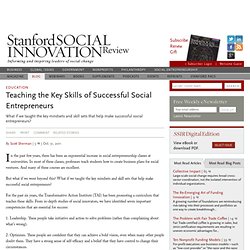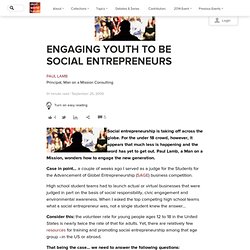

Teaching the Key Skills of Successful Social Entrepreneurs. What if we taught the key mindsets and skill sets that help make successful social entrepreneurs?

In the past few years, there has been an exponential increase in social entrepreneurship classes at universities. In most of these classes, professors teach students how to create business plans for social ventures. And many of these courses are excellent. But what if we went beyond this? What if we taught the key mindsets and skill sets that help make successful social entrepreneurs? For the past six years, the Transformative Action Institute (TAI) has been promoting a curriculum that teaches these skills. 1. 2. 3. 4. 5. 6. 7.
The important thing to note here is that each one of these qualities is something that people can develop with practice. For a long time, people thought that these traits were fixed. But now we know that people can develop these competencies. However, the financial downturn has made it more difficult to innovate on campus. How to set up a social enterprise curriculum. An inclusive vision of entrepreneurship is crucial to attracting students outside management or business.

Photograph: Clerkenwell/Getty Images Despite the widespread interest in finding, funding and supporting social entrepreneurs in higher education, embedding social entrepreneurship in the curriculum remains a key challenge. Here at Southampton we have launched an interdisciplinary module in Social Enterprise, which is open to students of all year groups and across all disciplines. The module has been a year in the making and there has been a steep learning curve. Winning initial support It's difficult to gain buy-in for a social enterprise course unless your university has an inclusive and distinctive vision of entrepreneurship. Ensuring disciplinary diversity To date, a lot of social enterprise activity in higher education has been routed through business schools. Providing ongoing support Social enterprise courses that exist in a vacuum don't work. Plugging into the ecosystem. Www-tc.pbs.org/now/enterprisingideas/acrobat/Becoming-a-Social-Entrepreneur.pdf.
Engaging Youth to Be Social Entrepreneurs. Curt – May 19, 2006 7:57 am (#25 Total: 88) Founder, SAGE and Professor, CSU-Chico (USA) To Start: Entrepreneurship First, Social Second Good day, everyone.

First, thank you, Paul Lamb, for leading this important discussion. Let me apologize for the length of this email, but I hope some of the ideas will provoke more ways to think outside the "parallelogram. " Second, both Paul and Van Ajemian have referred to a program called Students for the Advancement of Global Entrepreneurship—SAGE ( I am SAGE’s founder, and it is one of the outreach programs within the College of Business at California State University, Chico.
Third, before turning to Paul’s questions, allow me to provide a brief background about SAGE. SAGE competitions provide an opportunity to not only show off students’ efforts, but, also, “benchmark” themselves against other teams for future improvements. How will SAGE make "profit" to reinvest in outreach? Possible Answers: (a) first, agree on what a social entrepreneur is.
BizKids Teacher Resources for Teaching Kids About Money. Skoll Foundation.